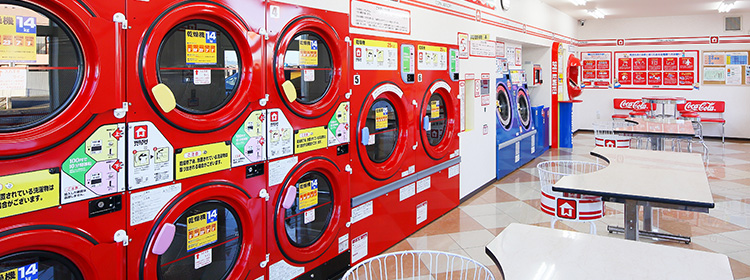
Q & A
We often hear the same comments and questions from our customers.
Some tell us, "I'm interested in the coin-operated laundry business but don't know where to start."
Others ask us, "What's the difference between the various coin-operated laundry stores out there?"
Here we answer the questions they most frequently ask.
Many questions focus on points of comparison between coin-operated laundry businesses.
- Q1What points should I consider when thinking of joining a coin-operated laundry franchise?
-
Maintaining a mechanism in the head office to generate sales and continue operating a business is an important factor.
- Store type (sales of machines only, individual management, franchise, etc.)
- How many stores opened and how many closed?
- Store locations. (Are stores located in areas where good sales can be expected? Or are they selected mainly where unused land can be easily procured?)
- How much work will need to be done after opening the stores?
- Is there a standardized strategy across the franchise for television commercials and advertisements on media such as newspapers and magazines (company-wide campaigns and grand opening commercials)?
Comparisons between head offices and capital are also important criteria for judgment.
- Q2What is the difference between WASHHOUSE and other coin-operated laundries?
-
In an ordinary franchise business, sales of coin-operated laundry machinery and receipt of franchise fees are top priorities. Contracts are generally concluded with owners who are willing to manage franchise stores, regardless of the property conditions. WASHHOUSE, on the other hand, examines whether good sales can be expected on the property. The big difference compared with other companies is our treatment of the business like an "investment." In conventional franchise businesses, franchisees are also usually responsible for cleaning and responding to complaints. WASHHOUSE takes on all of those tasks, freeing the franchise owners from all management operations. We also manage television commercials and advertisements on media like newspapers and magazines for all stores. This bulk entrustment style allows all stores to provide their customers standardized responses, quality, and safety.
- Q3Isn't the coin-operated laundry business a saturated market?
-
The utilization rate of coin-operated laundry now stand at only about 3 to 5%. The utilization rate in the Kyushu region used to be about 3%. Today, as a result of our proactive advertising activities such as television commercials, the utilization rate in the five prefectures of the Kyushu region has risen to more than 30% (Nagasaki and Okinawa not included). If the utilization rate in all of Japan can be improved to the same extent achieved in Kyushu, there is still room for more stores.
- Q4What are the problems facing the coin-operated laundry industry ?
-
One problem is the presence of illegal coin-operated laundries that ignore regulations and requirements. Many of these laundries violate regulations by:
- Using materials such as zinc and aluminum for exhaust ducts in washers and dryers. (Industrial washers and dryers are gas appliances. The Gas Business Act requires the use of SUS 304 stainless steel or stainless steel of a higher grade as exhaust duct materials.)
- Providing a laundry/folding service by staff in the coin-operated laundry store. (The Laundries Act prohibits store staff from washing customers' laundry using machines in the store or from offering folding or ironing services in Japan.)
- Q5I don't own a real estate. Can I still open a store?
-
There are many coin-operated laundry franchisees who open stores on real estate they own as a way to make use of an idle property. Most of the owners of WASHHOUSE open stores on properties we lease to them in areas where we expect sales to increase. Under this arrangement, anyone can become a franchise owner without owning a property.
Example: A franchisee can earn a greater profit from a property that requires a monthly rent of 200,000 yen (leasehold estate) but earns 1,000,000 yen in sales compared with a fully owned property that only produces only 500,000 yen in sales per month.
Our business proposals only involve properties expected to achieve greater sales. - Q6Some franchise chain stores offer a free royalty fee. Does WASHHOUSE offer one?
-
As the number of stores increases, we need personnel exclusively tasked even for receiving customer inquiries.
To respond to inquiries while ensuring compliance, at least 5 specialized staff members are needed to keep 1 staff member available to respond to incoming communications at all times. Likewise, about 7 to 8 specialized staff members are needed to keep 2 staff members available 24/7.
Certain costs are required to provide appropriate service while complying with laws and regulations. The service cannot be maintained for free.
For comparison, please contact some of our competitors to see how many staff they have registered as operators in their franchise call centers. - Q7How much does it cost to start a coin-operated laundry store?
-
The fee required is generally about 15 million to 25 million yen.
In WASHHOUSE, the opening cost for a standard type store is about 20.63 million yen (reference price as of May 2017 / construction fee excluded).
WASHHOUSE adopts original machinery and a system developed specially for our company. The machinery in other stores is never the same as the machinery in our stores, even if it is produced by the same manufacturer. - Q8Is cleaning once a week enough?
-
A few centimeters of lint will collect in a dryer filter after a single day of operation.
If the machine is operated without cleaning the filter, the drying efficiency will decline and the dryer will take more time to finish.
WASHHOUSE is therefore thorough in cleaning the washing equipment every day.
If the dryer in another store takes longer, you can doubt the thoroughness of its shop-cleaning routine.
